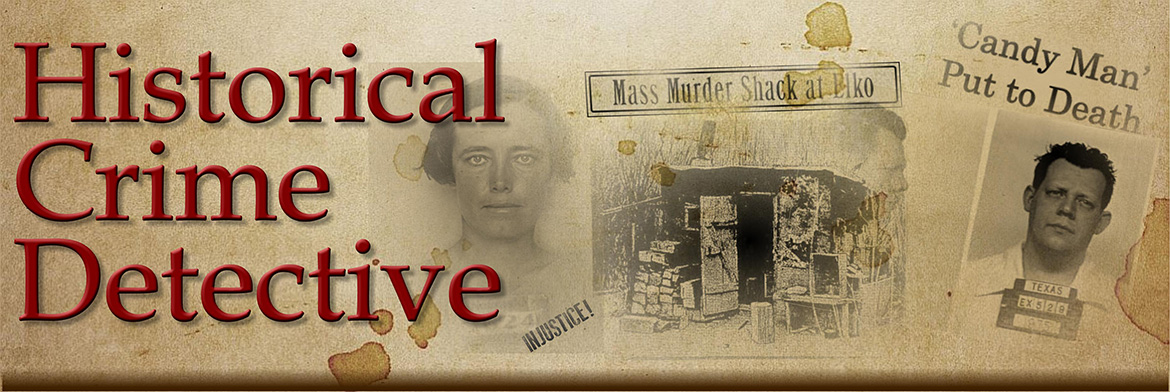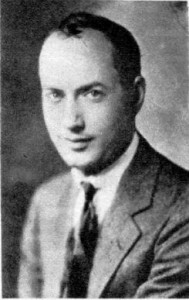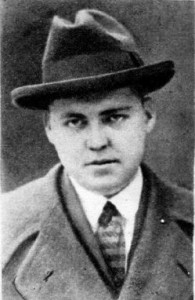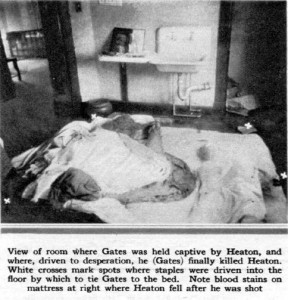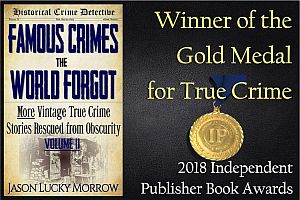The Torture House, 1924, Louisville, KY
Originally Published: “Torture House,” by Detective Lieutenant William Oeltjen, as told to Frederic Lord, True Detective Mysteries, Feb., 1930.
Download PDF File of The Torture House
Recently, while in my office in Louisville I was pondering on the dullness of life–in particular, of a detective’s life—when’ a question was put to me by a friend who had dropped in for a chat.
“Lieutenant, do you remember the Gates-Heaton case, here in Louisville?”
“Do I remember the Gates-Heaton case?” I replied. “I don’t suppose anyone who had anything to do with it will ever forget it!”
My friend’s query brought back the memory of that strange case—one of the weirdest I have ever known in all my years of police work. And, after a few remarks had been passed, I consented to tell him the story:
It was about 6:30 P.M. on a Saturday night, six years ago—March 8th, 1924, was the date, if I remember rightly—that we received the call at the Louisville Police Department Headquarters.
“A man has been shot!” the voice over the telephone shouted. “You’ll find him at Six-Thirty-Seven South Thirty-Fourth Street!”
Accompanied by several of my men I reached the scene in record time. We found the body on the second floor, in the bedroom. It was lying near a mattress—a circumstance odd in itself, because that mattress was lying on the floor. Surrounding the mattress were four steel staples driven into the floor. No one missed the picture it created, together with a number of surgical instruments that were in the room also.
Not much more than a glance showed us that the man was dead. There was a gaping hole in his neck, another near his heart. Several persons were in the room and, as is usually the case, they were incoherently babbling words about the killer. He had raced from the house, they said, when he made sure, on a doctor’s word in fact, that his victim was dead. On the killer’s wrists were handcuffs, his body was trembling, his face pallid.
There is not much use in telling all the minor details. Here are the main facts, as we ascertained them by rapid questioning:
The dead man was Richard Heaton, thirty-three years old, partner in a prosperous brokerage concern and a well-known and reputable citizen of Louisville. His home was on South First Street, where he lived with his charming and beautiful wife, and his two children, a boy and a girl, both in the elementary grades of public school.
His wife, who was related to a very wealthy Louisville man, was in the room, and so was a doctor, H. E. Schoonover, who happened to be in the neighborhood at the time of the shooting. This house was in a good residential section of Louisville.
Mrs. Heaton, who retained her composure with admirable fortitude, told us that William Gates her husband’s lifelong friend had done the shooting.
I at once obtained a description of Gates, and went across the street to use a telephone. I called Headquarters, and gave the desk sergeant what information I had. A hunt for Gates was immediately instituted.
Returning to the house, I found that a crowd had gathered about and that my men were having difficulty in preventing the curious from entering. I went back upstairs Mrs. Heaton was still kneeling beside her husband’s body. She said something that made me pinch myself to make sure I was not dreaming. She said her husband had held Gates a prisoner for two nights and two days. “He was chained to the floor in this room,” she told us. At once the significance of the mattress on the door, and the staples, dawned on me. Never will I forget that room and its contents.
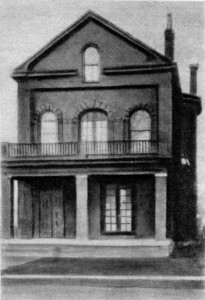
The house at 637 South 34th Street, Louisville where Bill Gates was to be tortured and possibly castrated.
I called Doctor Schoonover, and together we examined the surgical instruments. The Doctor commented on their quality, and told me that whoever had selected them must have had more than an ordinary layman’s knowledge of such things.
We found a surgeon’s knife, several pairs of forceps, a hemostat, about a dozen suture-ligatures, two or three instrument trays, a surgeon’s apron, rubber sheets and rubber gloves. There were a quantity of bandages, medicated gauze, absorbent cotton, disinfectant and a large can of chloroform—a complete outfit for performing an operation.
The man who had planned the operation, apparently, had also planned to remove a body. In case his victim died, he had provided three large, water-tight boxes, a large butcher knife and a very sharp hatchet. We also found a quantity of sulfuric acid. In all, it was about as gruesome a sight as anyone would care to see.
By that time, the fingerprint men had arrived. I had noticed imprints on most of the instruments, and I set the men to work. The rest of my men had been looking over the house, and a small garage in the rear. They had found several guns, both revolvers and automatics, and a lot of ammunition.
I was anxious to talk to Mrs. Heaton and to direct the search for the man who had done the shooting. So, leaving Lieutenant Jim Cundiffe in charge, I returned to Headquarters, accompanied by Mrs. Heaton. I had seen enough to realize that this was going to be a most extraordinary case.
When we arrived at the office Captain E. A. Larkin, then Chief of Detectives was there. He started asking questions. I told him what I had seen and the little I knew. Then we called Mrs. Heaton into his office.
She was very pale and considering what she had been through, seemed to have a pretty good hold on herself. It was a little hard for her to start but after a bit she began to talk.
She told us that she had eloped with Heaton some eight years before, when she was only fifteen years old. They seemed to have lived a happy and normal life up until the spring of two. Suddenly, and without warning, she told us her husband began to accuse her of being intimate with Gates, whom they had both known since childhood.
“At times,” Mrs. Heaton said, “his manner and the things he said almost became unbearable!”
Of course, she denied his accusations but Heaton, without any cause or reason, continued to berate her. This state of affairs continued for four years, in fact, up until the day before the shooting.
About four weeks before, Heaton had brought a woman detective to his home, a Mrs. Jenny Moore, of Chicago. Her duties were, to accompany Mrs. Heaton whenever she left the house to answer all telephone calls, and to prevent Mrs. Heaton from using the telephone herself. While I am on the subject of Mrs. Moore, I might add that her sworn statement, voluntarily given us a few days later, verified everything Mrs. Heaton told us that night.
Mrs. Heaton was growing paler. I asked her if she did not want to rest a few minutes. She shook her head, asked if she might have a glass of water and continued her story.
On Thursday, her husband rented the house on Thirty-Fourth Street for the express purpose of taking Gates there and “punishing” him. I could see that it had taken a lot of effort on her part to make that admission.
“I was powerless to prevent my husband from carrying out his plan.” Mrs. Heaton said. “You see, I was practically held a prisoner in my own home.”
Friday, the day before the shooting, her husband came home. He told his wife that he still had Gates. “But he laughed when he told me about it, and I was frightened more than ever.”
Saturday afternoon, Mrs. Heaton, not having heard from her husband since the day before and being almost frantic with worry, finally slipped away from Mrs. Moore, called a cab, and drove to the house where Gates was held captive. Her husband met her at the door, told her to come in and cautioned his wife to be quiet.
“He looked terrible,” Mrs. Heaton said. “He seemed to be under a terrible strain, and plainly showed the lack of two nights sleep. I felt sorry for him, and told him so. He only laughed. I asked him if he had Bill Gates upstairs, and he said: ‘Yes, and I am giving him the scare of his life! I bet he won’t bother either of us again!’ ”
Mrs. Heaton begged her husband to let his prisoner go, and give up his mad plan. Heaton absolutely refused to listen. They talked a few minutes, and then Heaton said he had to go back upstairs.
“I HAVE to watch Bill constantly, for fear he might get away,” he told his wife.
“I guess he had been gone about two or three minutes when, suddenly, I heard a voice say, ‘Don’t shoot!’ It was hardly more than a whisper, and then I heard two shots, fired in rapid succession.
“As I started up the stairway, Bill Gates came running down. He called, and asked who was there, and I replied, ‘Mary Lee.’ He didn’t stop. As he passed me, he said, ‘I have shot Dick, and I am going for a doctor!’ ”
Mrs. Heaton was nervously twisting her purse; her voice was hardly above a whisper. I was afraid she was going to faint. I fetched her another glass of water, and in a moment she seemed to be all right.
“I continued on upstairs,” she said, “and found my husband in the rear bedroom, lying near the mattress, just as you first saw him. He was breathing, and trying to say something. I couldn’t understand what he was trying to say. In a few minutes, some man came in and told me he was a doctor. He looked at Dick. I asked him if he was going to die. He said he didn’t think so.
“Just then, Bill called from downstairs and asked the doctor the same question.”
Mrs. Heaton said she made arrangements with the doctor to call her family physician and have her husband taken to a hospital.
“Then another man came in,” she continued. “He looked at Dick, and said he was dead. Just then I heard Bill again call from downstairs, and the man called back and told him my husband was dead. I haven’t seen or heard from Bill since.
“I knelt down and kissed Dick. I didn’t know what to do so I just sat there by his side.”
I know police officers are supposed to be hard-hearted and all that sort of thing, but I must admit that I never felt so sorry for anyone as I did for this woman. I hated to do it, and I know the Captain felt the same way, but we had to question her. There were several things that were not clear; and, of course, her story had to be checked. We had let her tell her story without interruption, going about it as gently as possible, and after about forty-five minutes of cross-examination, we were both convinced she had told us all she knew and that she had told us the truth.
I told Mrs. Heaton she could go and had one of my men take her home in a cab.
Then we had some good news. Heaton ‘s business partner was in the outer office and wanted to see the Chief. He was brought in at once. Without doubt, he would throw new light on the case.
He told us that his name was William A. Fisher, and that he was a member of the firm of Heaton & Fisher, merchandise brokers of Louisville. He had heard about the murder, and wanted to tell us all he knew about the affair.
According to Fisher, Heaton, for some time past, had been acting queerly. He told his partner that “several men were trying to break up his home.” For the last year he had neglected business, remained away from the office for long periods at a time, and failed to let his partner know where he was or how long he intended staying.
Fisher had tried in every way possible to get Heaton to attend to business, but Heaton had refused to listen to him.
Early in February he had told Fisher, “There is only one man left and as soon as I have attended to him, all my troubles will be over and I will return to the office.”
Fisher knew about the house Heaton had rented in the west end. Heaton told him about it, and said he was going to take the man there “and scare him to death.”
“I want to impress on his mind that he is never to cross my path again!” Heaton had told his partner.
Fisher had begged him to give up any such plan. “I told him that it was dangerous, and that he was only going to get himself into trouble. He refused to listen, and told me if I ever breathed a word to anyone about his plans, I would have to answer to him.”
We were interrupted. Officers had brought into Headquarters a man who they believed answered Gates description. He was in the outer office.
I rushed out. It wasn’t Gates. The poor fellow was half-scared to death. He had red hair, Gates had brown hair. I gave those patrolmen several different brands of call-down, and returned to the Chief’s office.
Fisher resumed his story. He said that on Friday, Heyde Conrad brought him a note from Heaton requesting Fisher to come to the Thirty-Fourth Street address that afternoon. I interrupted Fisher long enough to find out where Conrad lived, and learned that he was an organist in one of the down-town theaters. I sent a couple of men out to pick Conrad up and bring him to Police Headquarters.
“I went down Friday afternoon,” Fisher said, “hoping to bring Dick to his senses. He looked terrible. I could see he was very nervous, and laboring under a strain. He told me he had had no sleep for three days, and asked me to stay there in the house while he went home and got some sleep. “This I refused to do. He then asked me if I would stay while he went home and saw his wife. He promised he would only be gone about half an hour. He begged so hard that I finally agreed.
“He took me upstairs.
“In the back room, lying on a mattress, his arms and legs tied to the floor, a cover over his face, was a man. Dick told me he had put the cover over the man’s face because his prisoner was ashamed of what he had done and did not want his identity known. He assured me the man was securely tied and could not get loose, and then left.
“After he had gone, I noticed the man was moving as if he were trying to ease his evidently aching muscles. I asked him if I could do anything for him. He didn’t answer, so I just sat there.
In about thirty minutes, I heard Dick come in, and I went downstairs. I again begged him to let the man go. I told him he was sure to get into trouble. He laughed at my fears, and assured me again that ‘I am only giving him a good scare, and am not going to harm him in the least!’
“While I was in the room upstairs, I saw a hat and a coat that I thought I recognized. I asked Dick if the man wasn’t Bill Gates. He said, ‘It might be,’ and laughed. Then I pleaded with him harder than ever. I would have done anything to keep Dick out of trouble. He wouldn’t listen. He asked me to come back that night. I told him I might, and left.”
As you see, the story, so far as Fisher was telling it, was checking with the statement Mrs. Heaton had made. I don’t know whether I mentioned it or not but both these statements were made under oath. To continue with Fisher’s story:
After he left the house, he returned to the office, worrying all the while about Heaton. He decided not to communicate with the police, inasmuch as Heaton had assured him no harm would come to Gates. He determined, instead, to go back that night and try once more to reason with his partner to give up his plans.
“I went down about seven o’clock that evening—Friday. There was no one there but Dick and the man upstairs. I argued with Dick for about an hour, but nothing I said seemed to have any effect upon him. He would only laugh, and swear he was not going to harm his captive, ‘only scare him.’ I gave up, and started to leave.
“Just as I was going, I happened to look upstairs, and there, sitting on a bed in the rear room, handcuffed, his head in his hands, was Bill Gates.
“I became almost frantic with my pleading, but Heaton remained obdurate. So, I left, and went home, and did not go back. Someone called me to-night and told me about the shooting. I am sorry I did not notify you yesterday of what was going on, but at the time I thought the best way out was to leave Dick alone. I feel as though I am responsible in a way, for his death.”
Fisher had finished. I asked him if he had any idea how Gates had been captured, and if he could figure out how Gates had an opportunity, after three days of captivity, to get hold of a gun. Those were two points in the case so far, that we knew nothing about. Fisher couldn’t help us on either one. After a few more questions, we thanked Fisher and told him he could go.
Well, here we were; we knew, of course, who had done the shooting and the probable motive; but were still without any trace of the all-important Gates. I wondered, at the time, why, if it was a case of self-defense, Gates had run away. By now, we had got a little more information about our man. He was thirty-one years old, a salesman, employed by the Proctor & Gamble Company, working out of Logansport, Indiana, where he lived with an aunt. He was very popular and well-known in Louisville, where he had formerly lived. I had all the lines out, and felt sure we would have him before morning.
The fingerprint men came in and reported. They had found Heaton’s finger-prints all over the house, on the surgical instruments and on the revolvers, all of which didn’t help much, except to strengthen my belief, at that time, that Heaton had planned to carry out his plot alone. I studied the report carefully. The coroner called. He said Heaton had been shot twice, one ball piercing his neck, the other just above the heart. The shots had been fired from a .41-caliber gun, which accounted for the ugly wounds.
Still no word of Gates’ whereabouts.
THEN the patrolmen brought Conrad in. They had picked him up just as he was leaving the theater, where he was employed as organist.
Conrad couldn’t tell us much, however. He had known both Heaton and Gates for some time. The summer previous, he had made an extensive trip through the South with Heaton. Thursday, Heaton called him and asked him to come to his office about 6 o’clock that afternoon. When he arrived, Heaton introduced him to some man named “Frank.” He was told to go outside and wait in his (Conrad’s) car, and when Heaton left in his own, Conrad was to follow him.
After Conrad had waited a while, three men came out, entered Heaton’s car and started off. Conrad followed. They drove down into the west end and stopped in an alley. The occupants of the first car got out and went into a house, Conrad following.
When Conrad got inside, the man, “Frank,” was in the living-room. Heaton and the other man had disappeared.
“I asked Frank what was going on, and he told me that Heaton had some man upstairs who had stolen some stuff from hint. He told me everything was alright and not to worry.”
About ten o’clock, Heaton came down and told Conrad to take Frank to the Tenth Street depot and buy him a ticket to Indianapolis, and then go to the Willard Hotel and settle the bill for Room 342.
“I took the man to the station, but did not go to the hotel,” Conrad said. “I was worried about it all, and went back to the house to see if I could find out what it was all about.” Heaton told Conrad that he had some man who had caused him some trouble, but that he shouldn’t worry, as he was just having a good talk with him. Conrad said he spent the night there, and the next morning told Heaton he was going to leave and not return.
Conrad assured us that this was all he knew about the matter, and that he had not been near the place since Friday morning. “I didn’t like the looks of things,” he told us.
We held Conrad, and sent a man over to the hotel to check up on Room 342 and the man, “Frank.”
Well—it was getting pretty late, we had a good line on the case, but—where was our man, the man who had done the shooting? I certainly wanted to get him. I don’t remember when I ever wanted a man so badly in my life!
I left instructions that, if Gates was picked up, I was to be notified at once, and went home to bed.
The next thing I knew, the telephone was ringing, and I received the welcome news that Gates had just given himself up and was then on his way to Headquarters.
I tore into my clothes and hurried up-town. When I reached the office, Gates was there.
He plainly showed that he was under a terrible strain. He was very pale and nervous, but seemed more than anxious to talk. He told me that he had spent the night with relatives and after talking the matter over with them, had decided to give himself up. I was certainly glad to see him.
While we were waiting for the secretary to arrive, the Chief cane in. He was as excited as a schoolboy, and so was I for that matter, for I felt we were soon to get to the bottom of the whole mysterious affair. The secretary came in, Gates was put under oath and told to go ahead.
Here is his story:
“I had known Dick Heaton since childhood—in fact, we grew up together, and played together as youths. I did not know of his fears, his worry, his suspicions or his plot. I had been away from Louisville for some time. Nothing, however, interfered with our friendship.
“Thursday night (two nights before the shooting), Dick called me over the phone and asked me to come to his office. There was nothing unusual about that, and I went.
“Just as I stepped in the office I was grabbed! It was so sudden. I couldn’t move. I didn’t know what to do so I did nothing. I couldn’t have gained anything by resisting, because I could have been overpowered easily. I said nothing. I was taken to an automobile outside. A big man was watching me. He walked along by my side to the machine. But even if he had not been there, I could not have done much. I was handcuffed. The cuffs were placed on me as soon as I was grabbed.
“After a long ride, we went through an alley into a small garage. I was led to the house.
Dick took me upstairs to a back room. He tied me, and went down again. While he was gone, I thought how unlucky I was to have lost my pistol. It had been taken from me before I was handcuffed. Dick came back after a while, and I could see he was bent on mischief. I had sized up all the instruments: the sharp hatchet, the boxes and the rubber sheets.
“‘GET down.’ he commanded. I was forced to get on my knees. He then made me lie flat on the floor. He stretched my two legs apart and fastened my ankles to two staples leaving me spread out on the floor. I saw him take down the chloroform. He then got a funnel. He placed some cotton in it and poured out the chloroform. All the while he was calm as a man could be. He put the funnel upside down over my nose. I saw it coming, and took a deep breath. After he put the funnel in place, I held my breath for what seemed hours.
Gradually I relaxed my body and closed my eyes. I tried to feign unconsciousness, and apparently succeeded. He took the funnel away. In a moment he unbuttoned my coat. Then it dawned on me what kind of torture I was to undergo. I couldn’t move. I was afraid to say a word. He unbuttoned my vest, the right side of it. I felt something hard glide down my side. Then I remembered. It was my small pistol—a derringer—that I had forgotten about until this time.
They had overlooked it.
“This little pistol, not much bigger than a toy, brought renewed courage. I waited a very short time, and then I decided something had to be done at once.
“I began to mumble. Dick stooped over me and cooed to me like a baby, coaxing me to tell what I wanted to tell. —‘Go on, tell me all about it, don’t be afraid,’ he cooed.
“I saw my chance. I mumbled so he could make it out, that I had written several letters. I told him I had said in the letters that Dick Heaton would be responsible for any harm that might befall me. I told him that I wrote that Dick Heaton meant to murder me. He coaxed some more, and I told him I had sent the letters to my aunt in Logansport, Indiana, with whom I live, and instructed her to send them to the police in the event anything happened to me.
“This stopped him. He buttoned up my clothes and left me presumably unconscious. You can bet I was mighty glad when he left!
“I didn’t think I had long to live, but I didn’t give up hope entirely.
“Friday afternoon he brought Fisher, his business partner, into the room. At this time I was lying on the mattress on the floor, arms and legs tied and a cover spread over my face. Dick said he was going, and left the room. Fisher said he would step out of the room and give me a chance to make myself comfortable. He thought I didn’t want my identity known. I wasn’t sure Heaton had gone. In fact, I thought he was standing outside the door. I knew he would kill me if he heard me talking, and I didn’t want to run the risk of letting Fisher remove the cover from my face. I knew he wouldn’t be able to think, fast enough if Dick suddenly came in the door. So, I said nothing.
“Friday night, Dick took me in an automobile to his office. He placed a pistol at my side and told me to call my aunt in Logansport and tell her to send the letters to Heaton & Fisher’s brokerage office in Louisville. My aunt must have thought I was crazy for I had not written any such letters! However, I obeyed instructions. After that, I was taken back to my prison.
“Saturday, I thought all day long that my time had come. Dick would come into the room and look at me, I would pretend I was asleep, then he would go over and start fingering the instruments, all the while kind of smiling to himself. My nerves were near the breaking point. That night I told him to take me to the washroom. I told him I couldn’t stand it any longer. He agreed.
“When we returned, he prepared to chain me to the staples. He had to unlock my handcuffs, and I saw that my chance had come. I got my derringer from my vest pocket and pointed it at him.
“‘Put ’em up, Dick?’ I commanded. ‘Don’t waste any time!’
“His face changed in an instant. It became chalky white. His eyes got wild. He grabbed for his gun, and I let go with both barrels. He spun around, and fell.
“Then I knew I was free, and I raced from the room and downstairs, taking three steps at a time, and hollered: “‘Who’s there?’ I had heard a door open sometime before. Heaton’s wife answered. I didn’t stop. I ran out of the house as fast as I could.
“As I ran out the front door, I saw a man, and told him I had shot someone. I told him not to say anything. This all comes back to me now. I started running down the street. Then I thought of my hat and coat. I ran back and got them, and started running again.
“All the time I thought something in my brain would crack. I was looking for it any minute, I thought I was going insane, and I ran all the faster. I remember now that the loose handcuff was dapping at my side, hut I didn’t even try to conceal it. I don’t know what was in my mind—all I seemed capable of doing was to run, and I did that.
“I got on a street-car and rode a couple of blocks, then got off. Nobody asked me any questions. I couldn’t have answered them if they had. My mind was at a standstill. Finally, after running myself out of breath, I started for Harrods Creek, where I was visiting my father-in-law. I finally got home and after resting a bit, and after talking it over with some of my relatives, I saw my mistake in running away. I made arrangements to surrender at once.
“No matter how long I live, I will never forget the experience. It was too horrible; too cruel for words. I had read of such plots and plans in dime novels, but I never expected to live the victim’s part. I know I can never put it from my mind, but now that it is over, I am confident of being freed, and shall attempt to forget all of it I possibly can. I am sorry I had to kill Dick, but I had to do if to save my life.”
I had been a detective quite a few years but during my time I had never heard anything like the story Gates had just finished. It was unreal.
We let him rest for a while. Then we started our questioning.
First and foremost, we wanted to know why, if he wasn’t suspicious of Heaton, he had carried two guns when he went to the broker’s office.
He told us he had a hobby for guns, and was in the habit of carrying one. We found out later that day, that this was correct, and that he had purchased a good many guns during the last two or three years.
The Chief and I went at him pretty hard for about two hours. We were convinced he was telling the truth. Of course we had to put him under arrest, charging him with murder.
Thus you have the statements of the principal characters of this remarkable story. Imagine, if possible, the mental strain Gates was put through! For two long and insufferable days afraid to close his eyes for fear it would be for the last time; expecting his friend, suddenly turned fiend, to operate on him at any moment! Is it any wonder that he thought, after he had shot Heaton and escaped that he was going crazy, that something in his brain was going to snap? Think how he must have felt, when, after he was taken into the house and tied to the floor, the significance of those instruments dawned upon him. It is a wonder that something in his brain didn’t snap then and there. Think of the suspense, hoping his captor would not discover the derringer and destroy his one and only chance to escape. Try and imagine his condition, when his chance did come to use his gun! It was a clear ease of shooting in defense of his life.
About the time Gates finished his story, I had a report on the man, “Frank.” He was Frank Cordell, a private detective of Indianapolis. We made arrangements to get a Governor’s extradition warrant and have Cordell returned to Louisville at once.
BILL GATES was arraigned in court Monday morning [May 12, 1924] and released on bail. He was subsequently dismissed, the police court judge ruling that he had killed Heaton in self-defense. A coroner’s jury also absolved him from all blame.
Conrad was held to the Grand Jury charged with being an accomplice to the kidnapping. We brought Cordell back. His part wasn’t very important. He had known Heaton as “Peter Brooks,” and had been told by Heaton that “I want you to help me get a man who has been stealing from me.” Cordell admitted helping capture Gates when he came to Heaton’s office, and accompanying them to the house. He left that night for Indianapolis, and that was about all he knew about the affair, he said.
Conrad’s case was finally dismissed. Cordell received a sixty-day jail sentence for his part in the affair.
And thus the case was closed and the “torture house” tragedy ended.
—###—
